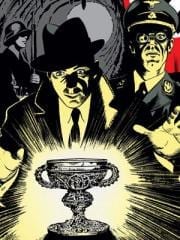Heinrich Himmler
Intervista a Mario Baudino: Otto Rahn, il cacciatore del Graal perduto
Cercava il Graal, trovò il nazismo. Mario Baudino< ha ricostruito nel Mito che uccide la storia di Otto Rahn, l'intellettuale tedesco largamente responsabile non solo del moderno successo turistico della Linguadoca, il ”Paese Cataro“, ma soprattutto della mitologia secondo cui i catari, gli antichi eretici del Midi francese, possedevano il Sacro Graal. La vita, breve, di questo misterioso e contraddittorio personaggio, morto suicida nel 1939 poco prima che scoppiasse la Seconda Guerra mondiale, ha lasciato dietro di sé un cumulo di leggende, trasformandolo in un eroe dell'occultismo. La verità storica, raccontata con piglio romanzesco in una ”inchiesta sul passato“ dove nulla è inventato, frutto di attente ricerche in Francia e in Germania, è invece diversa, anche più affascinante. Rahn incarna la figura dell'intellettuale novecentesco che stringe col potere totalitario un patto col diavolo, da cui viene stritolato. E nello stesso tempo è il maggior architetto di una favola destinata a sopravvivergli, ancor oggi molto popolare il tutto il mondo, che associa la mistica coppa cercata dai cavalieri di Artù all'eresia del XII e XIII secolo, ai templari, e infine ai nazisti.
Raiders of the Lost Grail
Berlin between the wars was a city known throughout Europe for its bohemian subculture of young intellectuals. Amongst the personalities who hotly debated the many modernist “isms” that were fracturing the old ideological certainties which had glued together the 19th century, few individuals were more colourful than a dark-haired, green-eyed young man named Otto Wilhelm Rahn. His gaunt figure, swathed in characteristic black coat and fedora, casts a long shadow out of those twilight years, a ‘great silhouette’ around which the most extravagant myths accrued. He was variously said to be a Mason, a Rosicrucian, a Luciferian, an agent of the Thule Gesellschaft, an initiated Cathar and even the leader of an obscure, international secret society. As author Philip Kerr puts it, Rahn’s contemporaries might not have been surprised to see “the Scarlet Woman and the Great Beast come flying out of the front door” of his apartment on Tiergartenstrasse. One of his Nazi peers in Heinrich Himmler’s Black Order remarked in an internal memo that he “half suspected Rahn of being in league with the little people”. To this day, it is widely believed that this enigmatic young man knew the whereabouts of one of the most sacred relics in all Christendom – the Most High Holy Grail. But the truth is stranger still…



Recent comments
13 years 50 weeks ago
13 years 50 weeks ago
13 years 50 weeks ago
13 years 51 weeks ago
14 years 2 weeks ago
14 years 7 weeks ago